Embodiment of "Non" in non-cognitive skills
The term "non-cognitive skill" is also known as "non-cognitive ability," "social and emotional skill," or "social and emotional ability." However, none of these terms has a consistent, clear definition. The term "skill" can be interpreted as technique, competency, or ability that can be acquired later in life but has not been used to refer to "innate ability." In this study, however, we decided to use the term "non-cognitive skill" to refer to both "innate ability" and "acquired ability."
In Japan's early childhood education and care (ECEC), non-cognitive skills are widely accepted because these skills have a high affinity for ECEC philosophies of learning environments, children's play, and comprehensive abilities. Nevertheless, many still consider that children's non-cognitive skills can be nurtured as a result of improving play quality, and do not pay much attention to data on non-cognitive skills that will contribute to educational intervention.3) This trend is due to the conceptual variations, mixture, ambiguity, and abstract nature of non-cognitive skills, failing to show a clear association with the philosophy of early childhood education and care.4) In other words, the meaning of "non" cognitive skills is not substantiated.
In addition, as non-cognitive skills have not been examined by linking to specific activities and objectives, solid and versatile definitions are not provided for "non" cognitive skills. To formulate effective methodologies for appropriate and purposeful teaching instructions, it is necessary to identify the "non" of non-cognitive skills.5)6) Therefore, we focus on the embodiment of "non" in non-cognitive skills supported by definite evidence.
Focusing on "Physical Play" in early childhood
Next, I will explain why we specifically focus on "physical play" to embody the "non" in non-cognitive skills in early childhood. Children's play is considered to be the core activity of importance in ECEC. Therefore, conducting research by reflecting on such core activities can achieve reliable findings with a high typicality. In addition, as in recent years children's physical health problems have become increasingly common from various aspects, the importance of fostering children's physical health and their emotional and social skills (non-cognitive skills) through physical play has drawn public attention.7) According to Gallahue, children acquire most skills through physical exertion; therefore, quality physical play activities can improve their cognitive and emotional skills.8) Considering these factors, we determined to focus on children's activities using the whole body (including the movement of the mind), such as physical exercises, physical play, group activities with games, physical expression play, outdoor play, and natural experiences in childcare settings.9)
Exploring mechanisms and determinants involved in the development of "non" cognitive skills The ultimate objective of this study is to clarify the determinants and mechanisms involved in the development of non-cognitive skills in early childhood and obtain data that will contribute to educational intervention. To understand the determinants and mechanisms of "non" cognitive skills, it was considered particularly important to examine differences in developmental aspects among groups of children at different ages. Therefore, the research survey targeted children 3, 4, and 5 years old to discover developmental variations through physical play experiences to embody the "non" in non-cognitive skills.
This survey was conducted by taking three steps as follows:
- Step 1: I collected and selected factor items, which seem to be non-cognitive skills in physical play, based on previous research studies.10)
- Step 2: Next, I asked childcare workers (with a minimum of three years experience) from kindergartens, daycare centers, and certified ECEC centers (287 facilities in total) to randomly extract two children (290 boys/girls of 5 years, 286 boys/girls of 4 years, and 286 boys/girls of 3 years). Then, we conducted a proxy questionnaire survey (answered by parents) using a five-point scale.
- Step 3: Finally, based on the data obtained in Step 2, I conducted an exploratory factor analysis by age and then cluster analysis using standardized factor scores.
*This survey was conducted under the Code of Ethics published by Aichi University of Education. We obtained consent from all participants regarding protection of their personal information, anonymity, and freedom of participation/withdrawal, as well as our retention of result data.
Determinants of "Non" cognitive skills
Tables 1, 2, and 3 below show the factor structure of non-cognitive skills by age. Distinctive concepts behind each factor describe "communality identified in previous studies."
For the group of three-year-olds, four factors and 23 items were extracted. Factor I is named "Endures" and has eight items of "emotional repression." Factor II is "Interest in other children," with seven items of "communication between self and others." Factor III is "Continues to strive to achieve their own goals," with five items of "curiosity, self-understanding, executive function of thought." Lastly, Factor IV is named "Does not consider failure," with three items of "optimism," meaning children always expect positive results, such as the items of "Does not worry about a few mistakes" and "Does not feel pressure."11)12)
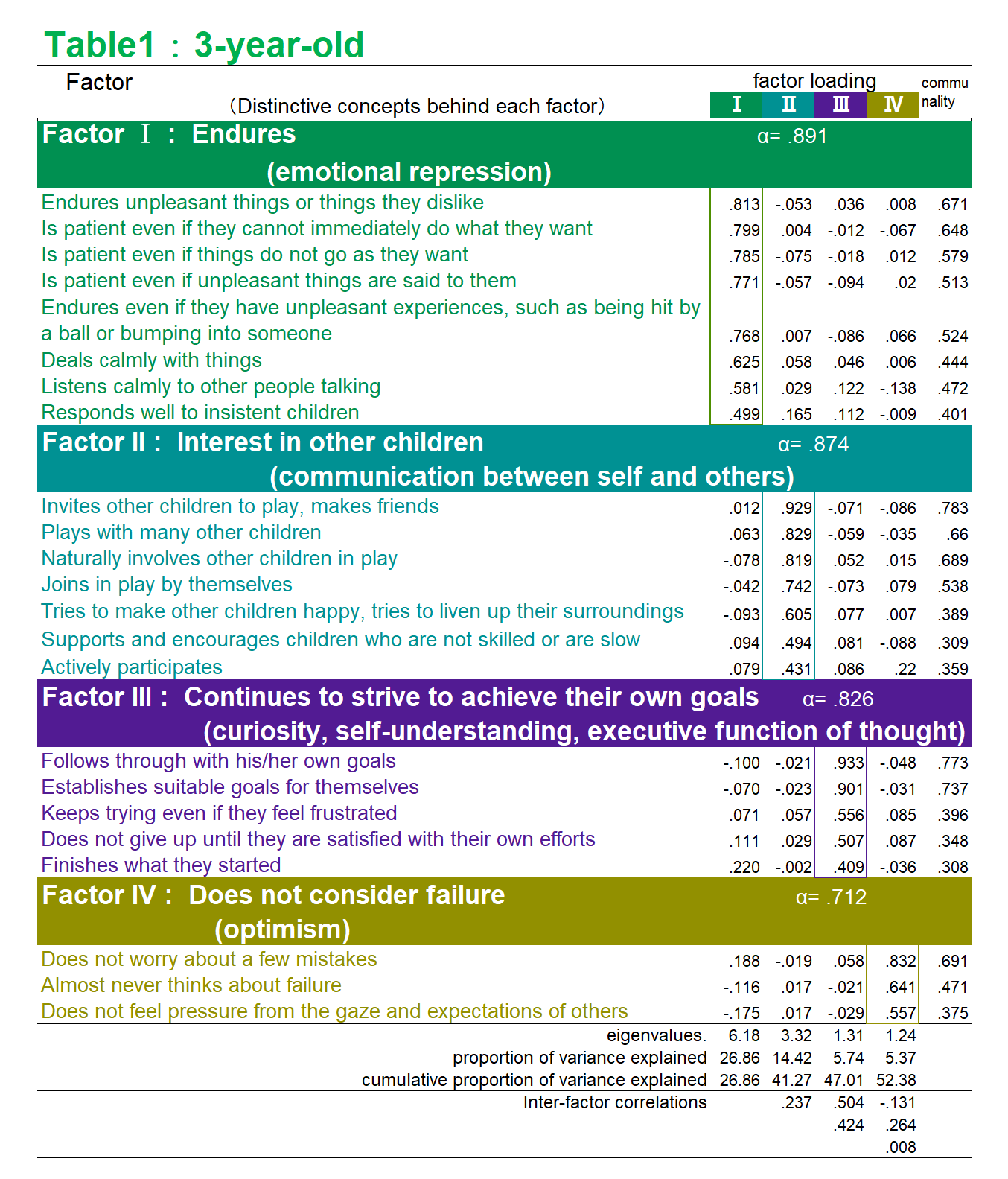
For the group of four-year-olds, five factors and 40 items were extracted. Factor I was named "Endures and comes to terms with" and has six items of "endures" and five items of "comes to terms with." Compared to the case of three-year-olds, the item of "deals with things/troubles" was added in addition to the item of "inhibition." Factor II was named "Challenges without fear," where three items of "resilience" were added to the four items of "self-esteem," and the ability of children to regulate their emotions by taking the situation personally when facing difficulties were observed. Factor III is "Trial and error to achieve a goal," with seven items of "diversive curiosity and tenacity." Children displayed tenacity of purpose by creating new ideas and alternative methods based on their diversive curiosity. Factor IV is "Commits to active engagement with others" and includes four items of "Interest in other children," shown in Factor II for three-year-olds. In addition, two items of "extroversion" and "adaptability" are added, indicating four-year-old's ability to build an interactive relationship with others, compared to three-year-olds who tend to have a one-sided relationship with others. Finally, Factor V is named "Maintains their enthusiasm," with five items of "passion, sustainment, and self-control," which more of these children can acquire than three-year-olds.
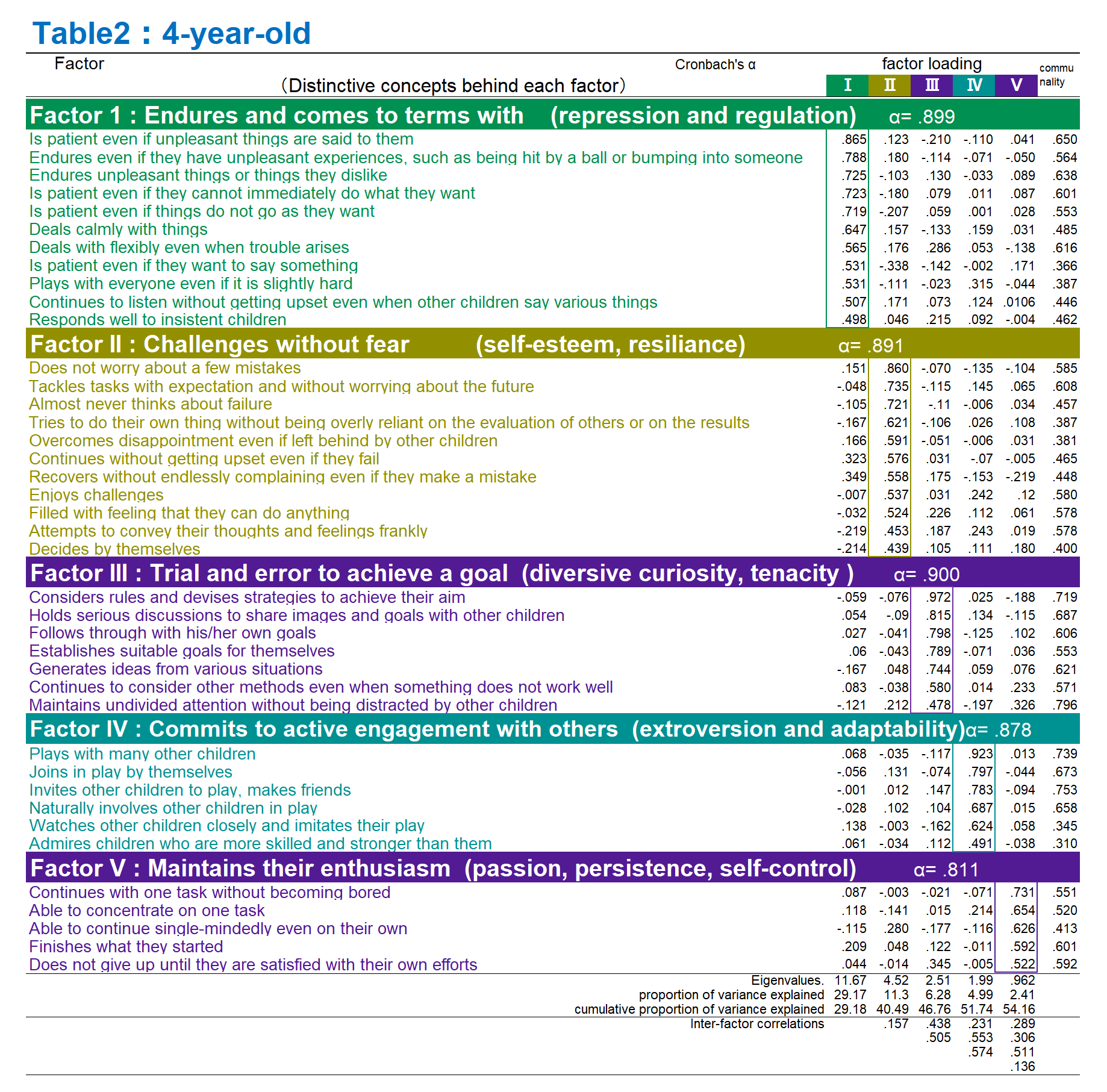
For the group of five-year-olds, seven factors and 38 items were extracted. Factor I is named "Works towards achieving their goal collaboratively" and has eight items of "goal achievement, self-restraint, and collaboration with others." Factor II is "Compassion to prioritize friends," with nine items of "prosocial behavior and empathy." These items were not shown in the groups of three- and four-year-olds. Factor III is "Challenges tasks based on self-esteem," with seven items of "self-esteem, passion, and challenge," including the items of "Does not consider failure" (shown in Factor IV for three-year-olds) and "Challenges without fear" (shown in Factor II for four-year-olds). Factor IV is "Puts up with a lot of stuff," with three items of "Patience." Factor V is "Being themselves among others," with four items of "sociability" and "assertion." Factor VI is "Adjusts flexibly to adversity" with four items of "resilience" and "ego resilience."13)14) The term "resilience" is the ability to recover from adversity or challenging situations, while "ego resilience" means the ability to adapt flexibly to stressful situations in daily life, being able to switch emotions swiftly. Finally, Factor VII is "Tenaciously accomplishes tasks" with three items of "concentration/absorption and persistence." This factor indicates that children's passion and sustainment (shown in Factor V "Maintains their enthusiasm" for four-year-olds) evolved to become "concentration and absorption." Likewise, children's ability to maintain something evolved to become "persistence (the ability to purposely or intentionally continue doing something)."
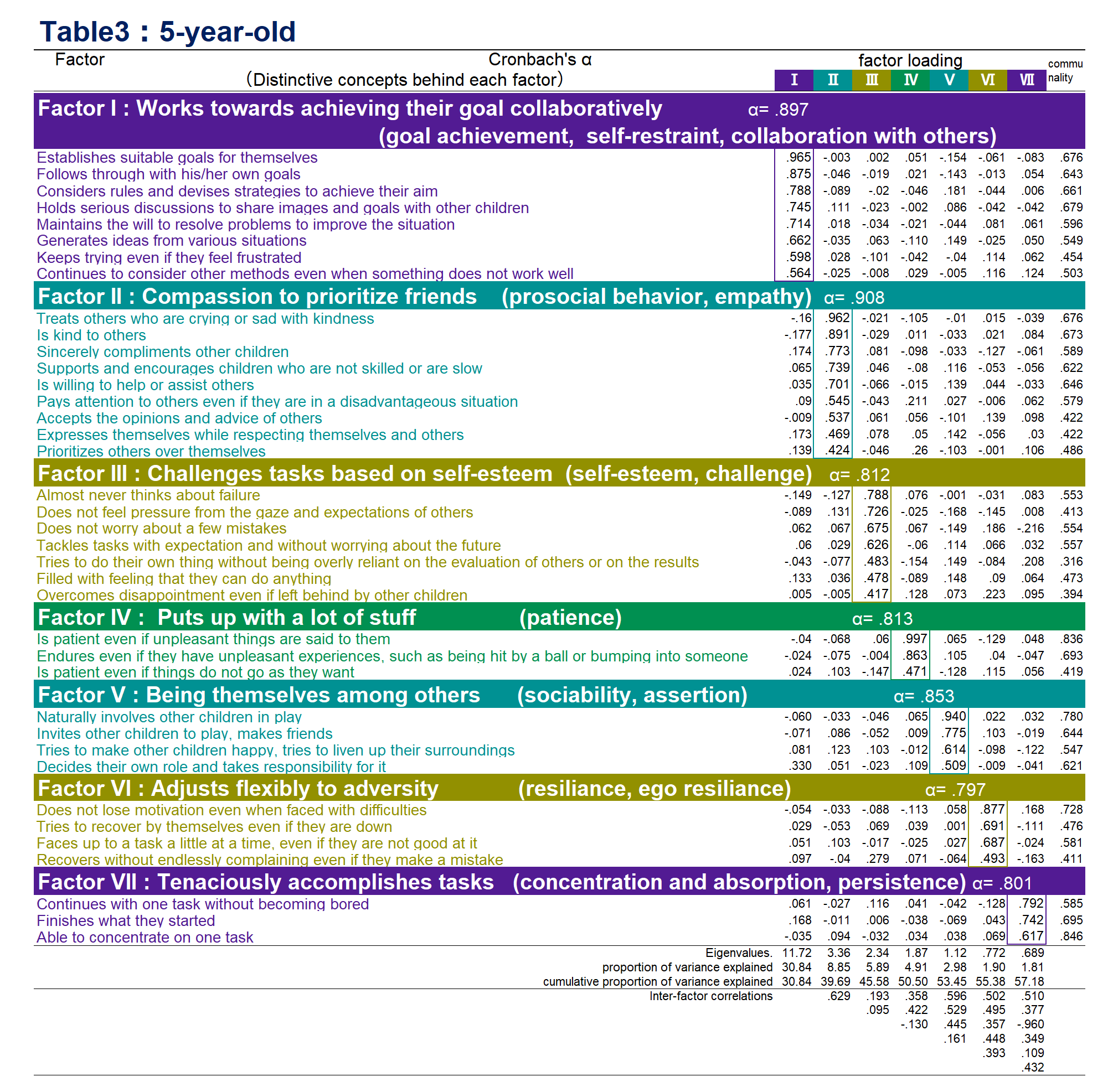
Identifying the determinants of "non" cognitive skills based on cluster analysis using factor scores
Next, we conducted a cluster analysis using Ward's method, producing standardized scores by age based on children's scores for non-cognitive skills. We classified this data into four to six clusters, describing the characteristics of each cluster based on comprehensive assessments of interpretability, etc., and mean-variance analysis (Figures 1, 2, and 3).
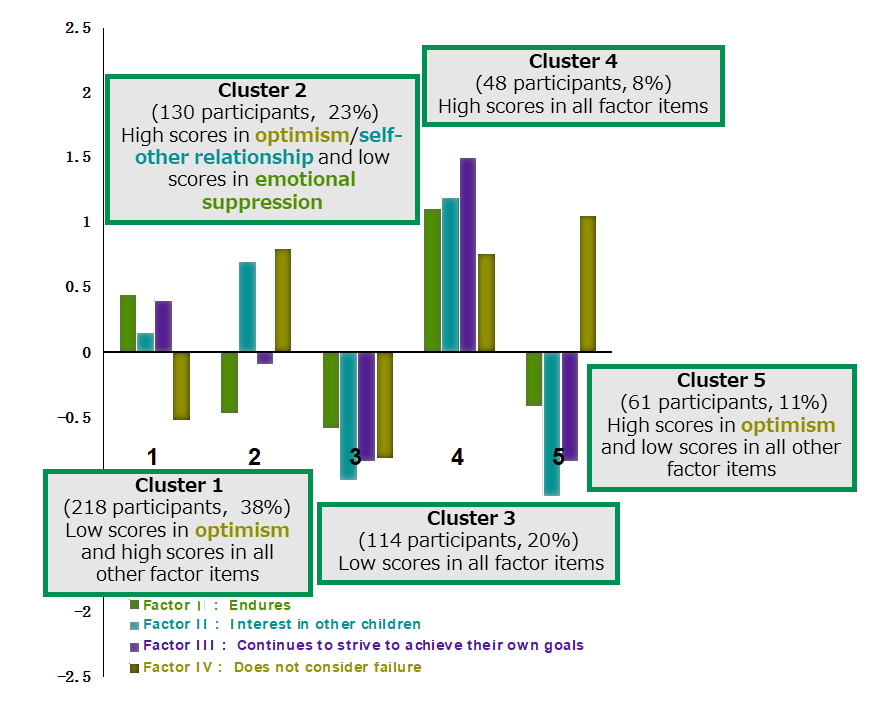
The scores of three-year-olds were divided into five clusters as follows:
Cluster 1: Children with low scores in optimism and high scores in all other factor items
Cluster 2: Children with high scores in optimism/self-other relationship and low scores in emotional suppression
Cluster 3: Children with low scores in all factor items
Cluster 4: Children with high scores in all factor items
Cluster 5: Children with high scores in optimism and low scores in all other factor items
The differences in clusters for three-year-olds were mainly determined by their scores in "optimism" (Factor I "Does not consider failure"). This indicates that young children are optimistic with baseless confidence, believing they can do anything and are easily tempted to go beyond their ability.12) This strong optimism encourages children to challenge various things, even if these things are too difficult for their age. However, children with high optimism scores are likelier to have low scores in patience, interaction with others, and executive functions. In contrast, children who showed a low score in optimism are more likely to have higher scores in other items. These results indicate that three-year-olds' non-cognitive skills typically display strong feelings of capability without regard for their actual competence; hence, they tend to try to do something recklessly.
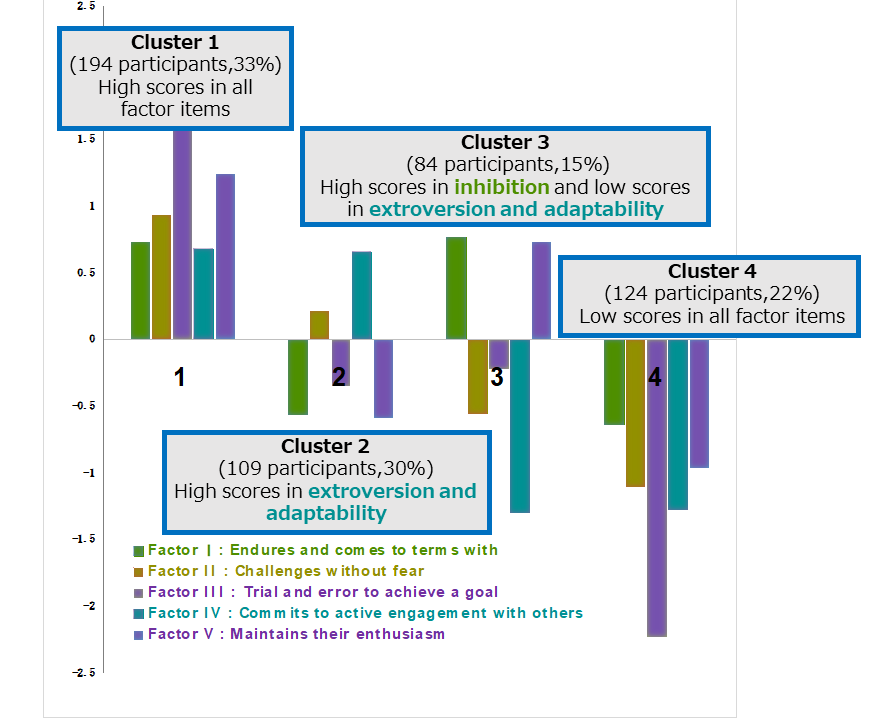
The scores of four-year-olds were divided into four clusters as follows:
Cluster 1: Children with high scores in all factor items
Cluster 2: Children with high scores in extroversion and adaptability
Cluster 3: Children with high scores in inhibition and low scores in extroversion/adaptability
Cluster 4: Children with low scores in all factor items
The differences in clusters for four-year-olds were mainly determined by their scores in "extroversion" and "adaptability (Factor IV "Commits to active engagement with others"). These results indicate that the factors of "self-other relationships" and "active engagement with others" are the determinants of non-cognitive skills for four-year-olds.
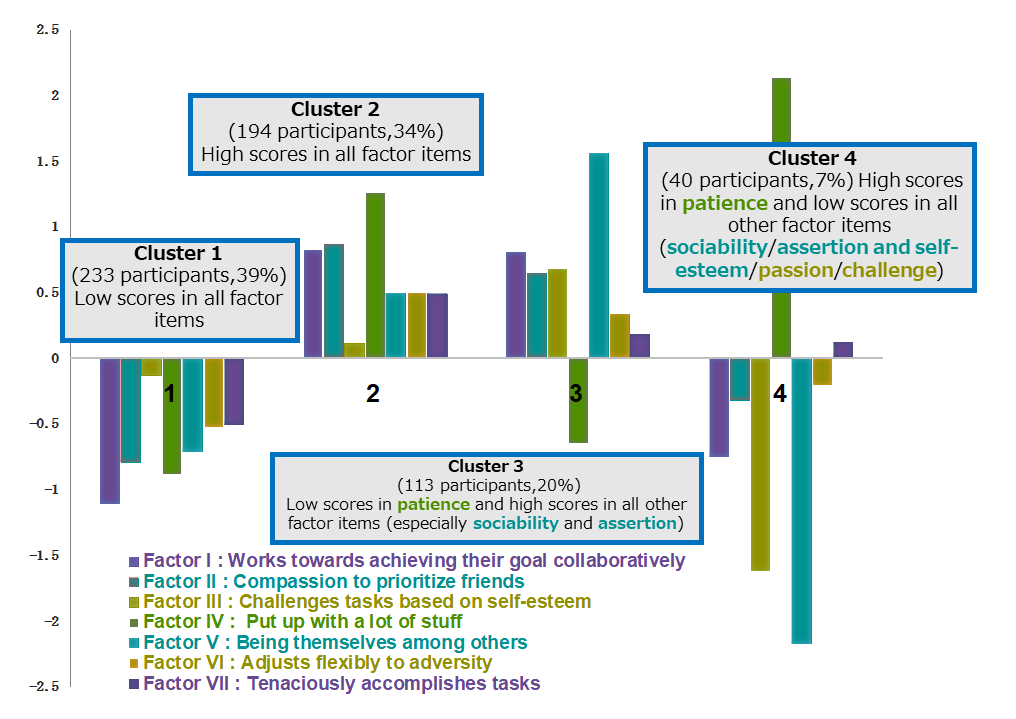
The scores of five-year-olds were divided into four clusters as follows:
Cluster 1: Children with low scores in all factor items
Cluster 2: Children with high scores in all factor items
Cluster 3: Children with low scores in patience and high scores in all other factor items
Cluster 4: Children with high scores in patience and low scores in all other factor items
The differences in clusters for five-year-old children were mainly determined by their scores in "patience." These results indicate that the factor of "patience" is the determinant, which coordinates between children's sense of independence (desire to act on their own) and their sense of duty (need to listen to and show consideration to others).
Outcomes of "Non" cognitive skills
The cluster analysis results show different non-cognitive skills according to children's ages. However, the determinates of non-cognitive skills do not necessarily differ by age. "Non" cognitive skills can evolve during the developmental process of self-control, self-other relationships, goal achievements, resilience, and other factors through consolidation and differentiation. This is a continuous accumulation mechanism. A specific state of "non" cognitive skills will evolve to a new state of "non" cognitive skills in the subsequent development stage.
In this survey, we identified the factors of non-cognitive skills, which are desirable for children to acquire through physical play by the end of their early childhood. In addition, these factors will give ECEC teachers valuable insights when preparing physical play activities and educational materials.
Cluster analysis results also show that the scores of "optimism" for three-year-olds, "extroversion and adaptability" for four-year-olds, and "patience" for five-year-olds determine children's cluster categories; therefore, these factors can be said to be the determinants of non-cognitive skills. That being so, what do these determinants mean?
When our research study was presented at the 2023 PECERA International Conference, we received numerous questions, such as "Are these determinants specific to Japan?" "Are they typical of Japanese children?" and "Are they common in any country?" The most common question was, "How do you interpret the analysis data about "optimism" emerging typically among three-year-olds and "patience" emerging typically among five-year-olds?"
We also received valuable comments as follows:
"I have mixed feelings. Three-year-old children show strong 'optimism,' but when they become five-year-olds, they seem to have to acquire 'patience.' They are taught in such a way through transition education from kindergarten to primary school, so they can get along well after they enter primary school. We observe the effects of transition education both positively and negatively."
"Japan's education system seems to foster people who can conform and adapt to living in a group. This is proved by the fact that 'extroversion' and 'adaptability' typically emerge among four-year-olds."
"Children acquiring 'patience' indicates that they develop 'resilience' based on compassion for others as part of their non-cognitive skills. This is proved by the factors emerging among five-year-olds, such as 'Compassion to prioritize friends,' 'Being themselves among others,' and 'Adjusts flexibly to adversity.'"
This survey needs further data to produce a sufficient number of conclusions. Therefore, we will continue an active longitudinal study to explore and verify the embodiment of "non" in non-cognitive skills. The next stage of our mission is to analyze the data obtained from that longitudinal study.
-
References
- 1) Nishida, Kiri, Aiko Kubota (Kawamoto), Akiko Tonegawa, & Toshihiko Endo. 2018. "The Review of Research on Non-cognitive (Socio-emotional) Competence." The Bulletin of the Graduate School of Education, the University of Tokyo. 58.31-39.
- 2) Organisation for Economic Co-operation and Development. 2018. "International early learning and child well-being study (IELS) in England: Introduction to the research," accessed January 10, 2022.
https://dera.ioe.ac.uk/32062/1/International_early_learning_and_child_well-being-study.pdf - 3) Muto, Takashi. 2016. "How to develop children's non-cognitive skills that support their life-long learning." The Benesse Educational Research & Development Institute, accessed October 1, 2022.
https://berd.benesse.jp/up_images/magazine/018-021.pdf (in Japanese) - 4) Endo, Toshihiko. 2017. "Research report on the development and scientific evaluation methods of non-cognitive (socio-emotional) skills." The National Institute for Educational Policy Research. 7-8.
- 5) McLaughlin, T., Karyn Aspden & Linda Clarke. 2017. "How do teachers support children's social emotional competence: Strategies for teachers." Early Childhood Folio.21.21-27.
https://doi.org/10.18296/ecf.0041 - 6) Rosenthal, M. K., & Lihi Gatt. 2010. "Learning to live together: Training early childhood educators to promote socio-emotional competence of toddlers and pre-school children." European Early Childhood Education Research Journal.18.373-390.
- 7) Sawae, Yukinori, Tomohiro Kizuka, & Shiro Nakagomi. 2014. Shintaisei konpitensu to mirai no kodomo no sodachi [Children's physical competencies and future developments]. Tokyo: Akashi Shoten. 3-4.
- 8) Gallahue, David L. 1999. Youshounenki no taiiku Hattatsu shiten kara no apurochi [Developmental Physical Education for Today's School Children] (translation supervised by Takashi Sugihara). Tokyo: Taishukan Publishing Co., Ltd. 37-48.
- 9) Shiba, Mariko. 1993. Shintai hyougen —karada-kanjite-ikiru [Physical Expression: Physically Feeling and Living]. Tokyo: Tokyo Shoseki Co., Ltd. 57-69.
- 10) Suzuki.Y. 2020. "The Effect of Physical Play Experiences on Early Childhood Non-cognitive Skills Development." Journal of Education and Development, 4-3, 54-72.
- 11) Scheier, M. F., & Carver, C. S. 1985. "Optimism, coping, and health: Assessment and implications of generalized outcome expectancies." Health Psychology, 4, 219-247.
- 12) Nakazawa, Jun, Mizuki Wakui, & Yoko Honda. 2009. "Youji no yunoukan no ninchi to suikouno kanren —youji rakkansei no shiten kara [Young children's perceived competence and their ability: consideration from young children's optimism]." The Bulletin of the Faculty of Education, Chiba University. 57.137-143.
- 13) Hirano. Mari. 2021. "Resilience." (edited by Atsushi Oshio). Non-cognitive Abilities. Kyoto: Kitaohji Shobo Co., Ltd. 225-238.
- 14) Onodera, Atsuko. 2021. "Ego-Resilience." Id. (13).239-252.















